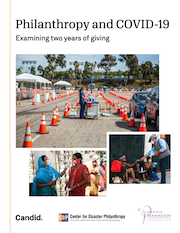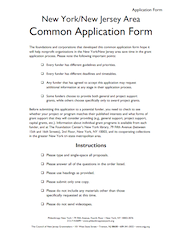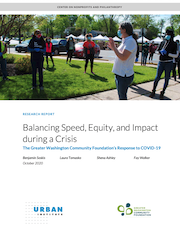Site Search
- resource provided by the Forum Network Knowledgebase.
Search Tip: Search with " " to find exact matches.
Joint Statement from CNJG and the Center for Non-Profits
This statement also appeared on NJ Spotlight.
A conversation between two customers in line at a New Jersey supermarket turned ugly when one man denigrated the other with a racial slur and blamed the fellow shopper for the coronavirus pandemic.
With so much else going on these days, it would be so easy to react to such a seemingly minor incident by saying, oh well, these things happen. Times are tough; tempers are short.
But shrugging our shoulders is not an option. Doing so is complicity in a wrongful acts that too often are repeated, over and over. Our silence merely emboldens those who would tear apart the fabric of our society, whether through hate or ignorance – or the extremely volatile mix of the two.
It’s not difficult to connect the dots between “little” incidents and the systemic racism that leads to tragedies like the killing of George Floyd in Minneapolis. When we ignore or accept any examples of people being demeaned over what they look like or where they (or their ancestors) came from, we only open the door for massive abuses and the wrenching reckoning that follows them.
We mustn’t be cowed by fear of being seen as overly sensitive or labeled “politically correct.” This is about being morally and ethically correct in the face of bias and hatred – and that shouldn’t be too much to ask of Americans, regardless of their political party or ideology.
As state Attorney General Gurbir Grewal said recently, “COVID-19 is no excuse for racism, xenophobia, or hate. Discrimination and harassment in violation of New Jersey law remains illegal even if it occurs against the backdrop of a global pandemic." It’s gratifying to live in a state where the top law enforcement officer speaks out this way.
Unfortunately, it also is a state where reported hate crimes are up in recent years. We can’t tolerate such behavior, whether by police, elected officials or “average people.” There is too much at stake for bias to become the new normal.
As the leaders of the major philanthropic and non-profit membership organizations in New Jersey, representing both the wide range of non-profit groups and the multi-faceted funders of those groups, we feel compelled to speak out against the hateful responses we and our members have witnessed in reaction to the COVID-19 Pandemic.
Our country has seen countless examples of selfless sacrifice and good works over the past weeks, both on individual and institutional levels. We are proud that the members our organizations have been leaders in responding to the needs of our community.
But to our distress, some individuals are using the pandemic to put forward their bias and hatred toward their fellow citizens.
Times of crisis bring to the surface, on the part of some people, the need to scapegoat. Often, this takes the form of lashing out at particular groups, stirred up by inflamed rhetoric or more subtle code words or phrases, having no relationship to facts. In this time, there have been verbal and physical attacks against people of Asian and Pacific Islander background, as there were against Muslims after September 11 and against African-Americans and Latinos in countless other instances. This hatred and these attacks must stop.
The non-profit sector is the backbone of our communities, providing assistance and education to a wide range of people, in good times and especially in challenging times. Many of these services are a lifeline to people of all backgrounds, religions, ethnicities and statuses in life.
Non-profit organizations are the vehicle through which people can work together to selflessly assist others. People around the world view the United States as being unique in the breadth and depth of its charitable and philanthropic work, engaging the talents of all individuals, regardless of their economic or social status.
We call upon all people of good conscience in their good work to be alert for hateful words and actions and – always -- to speak out against them, both as individuals and as organizations.
Our language and our actions do matter.
Everyone, and especially people in positions of public trust or prominence, has the obligation to use our works and our lives to assist all in need and to honor the dignity and potential of all those we meet.
We call on not only our own members, but everyone who serves and volunteers in our sector to join us in this effort to speak out against racism and hatred and to exemplify all the best that we know our country is.
Maria Vizcarrondo
CNJG CEO and President
Linda Czipo
Center for Non-Profits CEO and President
William V. Engel
CNJG Board Chair
Gina M. Plotino
Center for Non-Profits Board Chair
Launching New Jersey’s Philanthropy Hub
NJ’s one-stop, most comprehensive source for grantmaking data and nonprofit insights.
Philanthropy is most effective when it is transparent, informed, and collaborative. The New Jersey Philanthropy Hub brings the state’s giving landscape into clear view—empowering funders, nonprofits, and policymakers to strengthen communities, drive innovation, and build a more equitable future for all New Jerseyans.
Developed by Impala and launched by the Council of New Jersey Grantmakers in partnership with the New Jersey Center for Nonprofits, this free, open-access platform provides an unprecedented view of New Jersey’s nonprofit and philanthropic sector.
Jersey-wide Access
All New Jersey-based nonprofits, including all members of CNJG and the New Jersey Center for Nonprofits, receive complimentary access to the NJ Philanthropy Hub and Impala Core through October 2028.
Funders and their nonprofit partners (even grantees in different states) also receive complimentary access to the NJ Philanthropy Hub and Impala Core through October 2028.
What You’ll Find Inside
Comprehensive Landscape View
Profiles of all thousands of New Jersey nonprofits and philanthropic foundations, with financials, staffing, and giving history.
Smart Classification
Explore organizations organized into curated ecosystems, such as environment, health, and education, so you can quickly find peers, partners, or grantees.
Deep Grant Transparency
See every grant awarded to a New Jersey nonprofit, from every foundation across the country, revealing who is funding what and where new opportunities lie.
Clear and Actionable Insights
Track giving flows, spot gaps and overlaps, and benchmark your organization against peers across size, mission, and geography.
Who It’s For
Funders: Discover new grantees, identify funding gaps, and coordinate with peers to maximize impact.
Nonprofits: Showcase your work, connect with funders, and access every grant given to New Jersey nonprofits.
Researchers, Policymakers & Media: Gain clear, comprehensive insights into New Jersey’s philanthropic sector.
Join the Hub!
If you missed the October 23 webinar launch for nonprofits, watch the recording here.
If you missed the October 24 launch for grantmakers, watch the recording here.
Sponsor Acknowledgement
CNJG and the New Jersey Center for Nonprofits sincerely thank the following organizations for their crucial support of the NJ Philanthropy Hub that enables us to offer this for free for all nonprofits and funders in New Jersey through October 2028: The Campbell's Company, Community Foundation of New Jersey, Geraldine R. Dodge Foundation, F.M. Kirby Foundation, Grunin Foundation, Princeton Area Community Foundation, PSEG Foundation, and Robert Wood Johnson Foundation.
Join the Council of New Jersey Grantmakers -- your New Jersey-based community of practice for funders!
CNJG supports the philanthropic sector through shared learning, collaborative and trusting relationships, thought leadership, and advocacy efforts. By joining CNJG as a member, your grantmaking organization is connected to dozens of other organizations across the state that give out grants, and you support the work that, in turn, benefits you and New Jersey’s philanthropic sector.
Nonprofits: We recommend you joining the New Jersey Center for Nonprofits, as nonprofit organizations who do not have a grantmaking program are ineligible to join CNJG.

Stanford Social Innovation Review is a quarterly magazine produced by the Stanford Center on Philanthropy and Civil Society at Stanford University.
CNJG members are eligible for $10 off a subscription to Stanford Social Innovation Review (SSIR). The discounted rate is $39.95 for a one year print plus digital subscription for U.S. subscribers who subscribe online with credit card.
To obtain this discount, visit the Forum & CNJG members page on the SSIR website.
SSIR also offers a free enewsletter, announcing news and events of interest to nonprofits, foundations, and socially responsible businesses. Signing up is very fast and easy—just go to their homepage and enter your email address in the enewsletter box.
Valley Bank has donated approximately $1 million to nearly 100 New Jersey-based organizations supporting relief efforts for COVID-19.
Through its Community Pledge Certificate of Deposit program, the bank has donated $2,183,000 to 264 organizations across its footprint. In New Jersey, approximately $953,000 was distributed to 97 organizations.
In 2020, Valley Bank offered a new, innovative Community Pledge CD designed to give back to organizations in the community that have been affected by the COVID-19 pandemic. The CD offered a market rate and Valley matched the interest with a direct donation to community organizations that were providing relief in support of the COVID-19 pandemic.

A key objective of the Scaling What Works initiative has been to translate insight and learning from grantmaker intermediaries involved with the Social Innovation Fund and share them with the broader philanthropic community. The fifth guide in the Lessons Learned series presents the benefits and challenges of partnerships between local and national funders, and highlights key considerations for both kinds of funders to foster success in their collaboration.

- Frequent moves are the most significant barrier to academic success, as they disrupt both students and teachers. Students on the move need extra time and attention to get caught up, requiring teachers to spend more time with those students.
- Students who are unable to find stable shelter have difficulty meeting state or district mandates regarding the number of days they must attend school to stay enrolled.
- Often, the slow transfer of student records, along with differing course requirements from school to school, complicates the accrual of sufficient credits for homeless students to be promoted and receive a high school diploma.
Food is essential. But how often do you consider where your food comes from?This issue of What Funders Need to Know from the Washington Regional Association of Grantmakers explores the stages of the food system, from production all the way to disposal. Why is this important to philanthropy?
Because hunger, food insecurity, nutrition-related chronic disease, the health of resource lands and waterways, wages, and equal opportunity in the food economy all converge in our regional food system.
This paper explores community democracy as a cultural choice and a potential organizing system for philanthropy using stories that demonstrate its principles and practices, primarily growing from the experience of northern California communities. This experience offers a framework of principles and a beginning set of conclusions about how philanthropy can develop productive partnerships from the perspective of a place-based, community democracy.

The COVID-19 public health and economic crisis has changed our world as we know it. As employers moved to remote work, schools shifted to distance learning, and businesses closed completely, it became clear that the impact on residents, nonprofits, and businesses was far greater than anyone could have ever imagined.
In response to the growing and evolving needs of our region, the Greater Washington Community Foundation established the COVID-19 Emergency Response Fund to raise and rapidly deploy funding to local nonprofits providing food, shelter, educational supports, and other critical services.
From the beginning our goal was clear: to address the immediate needs and reach adversely affected communities, particularly low-income households and communities of color. We know all too well that in a crisis like this, these marginalized communities are hit the hardest, and often take the longest to recover.
In times of crises, The Community Foundation is our region’s philanthropic first responder, bringing together individuals and families, philanthropic peers, corporate partners, and local government advisors to address community issues. Building on our rich history of emergency response work, we grounded our COVID-19 response efforts in a similar coordinated approach.
This report chronicles the steps taken, under immense pressure, to develop a coordinated emergency response effort to support a broad range of needs across the region. Once again this effort has demonstrated that working in partnership and close collaboration with our philanthropic peers and local government advisors is an effective way to manage a response to both urgent and longer-term needs.


